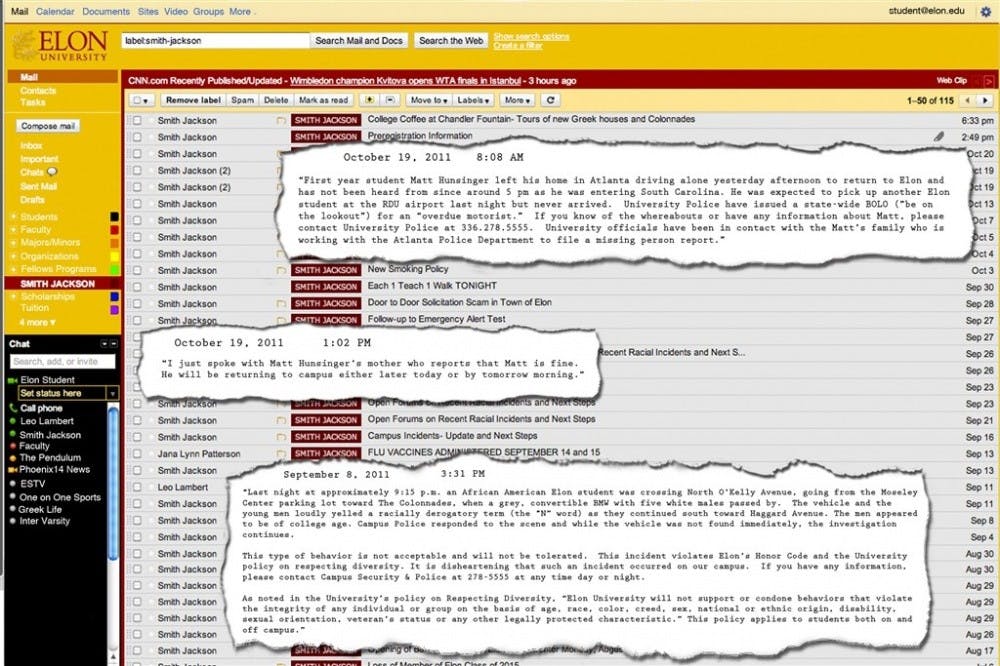Around 8 a.m. Oct. 19, students received a notification on their phone or laptop about an email from Smith Jackson, vice president of Student Life, titled "Missing Student." The email said that freshman student Matt Hunsinger had not been heard from since 5 p.m. the day before.
About five hours after the initial email from Jackson, another one was sent saying that Jackson had spoken with Hunsinger's parents and that he was fine.
Hunsinger was never a missing person. He is just the latest in a string of Elon students and alumni who have dissapeared recently, to only later learn that they are not actually missing.
On Oct. 8, social media alerted the Elon community that senior Heidi Fuller had not returned home after attending Dayglow, a popular paint party in Raleigh. People learned of her whereabouts in less than 24 hours.
In May, reports went out that Matt Hill, a 2008 graduate, had not been heard from. Hill was considered a missing person by the Metropolitan Police Department in Washington, D.C. There was even a "Find Matt Hill" Facebook page created. Later, people learned that he left and returned home on his own accord.
Student media, including The Pendulum, reported on many of these incidents. The Pendulum staff felt it was their duty to inform the community about these incidents in case someone could help.
In all of these situations, the Elon community was alerted through email, social media or both. As a society, we are dependent on electronic devices. We use our news feeds from our social media sites as one of our main sources for news. In situations when we are not supposed to use our phones, like the classroom, we feel like we are missing something without our favorite device in hand. But now it has gone further than that. If we don't have our phone, other people think we have vanished, too.
Everyone is so connected and dependent on technology that for someone to go a few hours without contact leaves people worried. Do people no longer have the right to privacy? Has the new era of technology erased the right people have to turn off their phones and computers?
These recent events have made The Pendulum reconsider its policies on reporting on missing people. From now on, people over the age of 18 must be out of contact for at least 24 hours before we will report on the incident, unless there are suspicious circumstances. While we want to inform the community, we do not want to make a spectacle of young adults who decide to turn their phones off or get away from reality for a brief amount of time. We encourage other organizations, including the administration, to do the same.
Technology has brought with it many advancements and conveniences, but it has also caused sacrifices. Every moment of our day can be preserved online. This leads to new questions and concerns. While we have the ability to share everything and be notified of every incident, should we?
On Sept. 30 at 9:44 a.m., an email was sent from Jackson about an incident of disrespect on campus. The email said "two females and two males had been walking together when some other male students walking in front of them started whistling to the girls inappropriately. An argument ensued and the female student was pushed to the ground; she fell backwards and hit her head on the bricks."
While it is important that all members of Elon University strive to keep this community as one where there is respect, and it is unfortunate that this girl was hurt in this incident, it makes one wonder what warrants an email from the vice president of Student Life? Is it anytime that there is disrespect shown on campus? Because if this is the definition, we should all expect several emails an hour. Is it anytime someone gets hurt? Is it anytime the campus police or town police want tips to help them figure out a case? Or is it when the community is in danger?
There is no easy answer to what warrants public attention and as fellow gatekeepers of information, we understand the difficulty in judging what is urgent enough to warrant publication. But Jackson emails are another form of news for this community and it's time to tighten the belt a bit. A girl gets solicited for sex from a stranger in a truck? We need to know. A girl gets whooped at from a passing car? We don't. A racial slur is said to a student? Tell us. An adult student doesn't answer a phone call for a few hours? No email needed.
This isn't about caring or not caring about other students on campus. This is about recognizing what is information-worthy and what is not. Sometimes, the saying "mind your own business" is dead-on.


